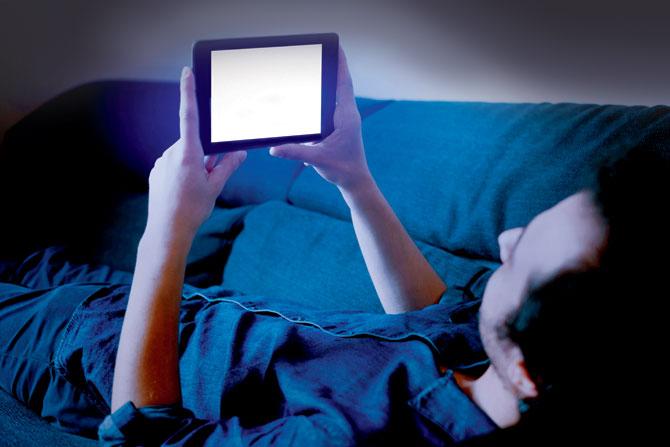As India's first case of Netflix addiction gets treated, here's why you should think twice before you plan to devour a new season of your fave web series in one sitting

Seven hours of non-stop Netflix won't immediately set the alarm bells ringing — most viewers will confess to spending a good part of their weekends binge-watching their favourite series with some even planning elaborate watch-parties with like-minded friends. In fact, the video-streaming company has long encouraged binge-watching, often releasing all episodes of its original shows at one go for fans to lap up.
ADVERTISEMENT
But, as a 26-year-old in Bengaluru recently found, these binge sessions can easily become frighteningly regular and bring about serious physical, social and occupational consequences. This individual, who is currently being treated at the National Institute of Mental Health and Neurosciences (NIMHANS), has been called India's first Netflix addict. But if mental health experts are to be believed, he is definitely not the only one.
"With the World Health Organisation recently recognising gaming addiction as a mental health disorder, there is growing awareness about the long-term consequences of the manner in which people spend their screen time. However, since these types of addiction don't have any physical symptoms or dependencies, it's easy to brush them off as inconveniences or indulgences that can be addressed at a later time," explains Dr Nahid Dave, psychiatrist at Insight Clinic. And while other types of addictive substances, such as cannabis or tobacco, aren't a mainstay of our daily routines and can hence be cut off completely, it is impracticable and quite untenable to advise Netflix addicts to completely stay off their computers or mobile phones, she adds. This, she says, makes treatment slightly complicated.

Dr Kanan Khatau Chikhal
In April 2017, Netflix sought to address some of these concerns by broadcasting to users in the US, UK, Canada and Ireland specially designed announcements warning against the perils of binge-watching. However, India, which is a more recent entrant to the online streaming boom, is still in the early throes of coping with the impacts of easy connectivity and the long-term consequences thereof.
Who is at risk?
Especially vulnerable are those who seek the mindless state that Netflix binge sessions bring about, which helps them get their minds off an unpleasant emotional state or to procrastinate on a scenario that generates anxiety, says Dr Dave. In fact, the Bengaluru gent says that his addiction was spurred by environmental stress, and that watching the popular streaming service played an important role in helping him to relax.
Others, who may succumb to such addictions, are individuals with a lot of spare time or those working on projects (such as writing a book or creating a painting) with no fixed deadlines. As is the case with other types of addictions, this one too is linked to your brain's reward system — it stimulates the release of dopamine, a feel-good neurotransmitter, thereby generating a psychological dependence, says clinical psychologist Dr Kanan Khatau Chikhal. These types of addictions are, therefore, as common among school-going children as they are in our country's geriatric populations, Dr Dave says, listing it among the top concerns of the patients she treats every day.

Dr Nahid Dave
Pointing out that series focusing on detective work or forensic science are typically the most addictive, she adds that viewers often experience a false sense of accomplishment, of having learned something they did not know before. Also, with episodes being carefully designed to end with cliff-hangers, viewers find it hard to resist the urge to keep watching subsequent episodes.
How is it addressed?
The first and most crucial step is for the addicted viewer to accept that there is a problem. Here, Dr Dave advises asking the person to write down both the advantages and the disadvantages of their viewing habits. While the person may try to explain away the disadvantages, helping them understand that any perceived gains are both short-term and invalid, and that they have more to do with impulsive, instant gratification, can help them gain some perspective, she says.
Even if the individual is able to balance their viewing habits with their professional consequences, their social life and the time they spend towards familial obligations may be compromised. At the same time, having the person make a note of the time of day, the place and their state of mind while binge-watching over the last week, for instance, could help them to identify whether their dependence can be attributed to them not realising when things inadvertently went too far, or whether they are using this addiction to mask any latent anxiety or depression.
From binge to obsession
Dr Nazneen Ladak, psychiatrist at Axis Hospital, Andheri, recalls treating a 23-year-old who reported increased feelings of restlessness irritability, anger outbursts and negativity towards his friends and family members. Closer examination revealed that these were linked to his habit of watching movies on his cell phone.

Dr Nazneen Ladak
"What began as a stress buster, gradually became a preoccupation as the movie binge sessions became longer and more frequent. As a result, he had begun procrastinating on other important work. His behaviour began changing too — while once an extrovert, he became short-tempered and irritable, especially when confronted by family.
His job and relationship began to suffer, and his family finally sought professional help," she says. Treatment included getting him to refrain from using his cell phone for a certain period of time every day by setting short-term goals.
His attention was diverted to other, more meaningful tasks such as spending time with friends and family. He was also taught relaxation techniques including breathing exercises.
Are you at risk?

If your answer to any of the following questions is yes, it's time to take a closer look at your viewing habits:
- Do you find yourself regularly increasing the amount of time you dedicate to viewing?
- When not watching an online streaming channel, do you find yourself craving the experience?
- Do you plan your entire day around your viewing habits?
- Do you forsake other commitments, including your social and familial obligations, to satisfy your craving?
- Is your sleep routine affected by your viewing patterns?
- Given that it is usually very difficult for those affected to accept that there is a problem with their viewing habits, any aberrations are usually pointed out by close friends or family members. In these cases, Dr Dave advises getting a second opinion from a mental health professional.
Catch up on all the latest Crime, National, International and Hatke news here. Also, download the new mid-day Android and iOS apps to get the latest updates
 Subscribe today by clicking the link and stay updated with the latest news!" Click here!
Subscribe today by clicking the link and stay updated with the latest news!" Click here!







